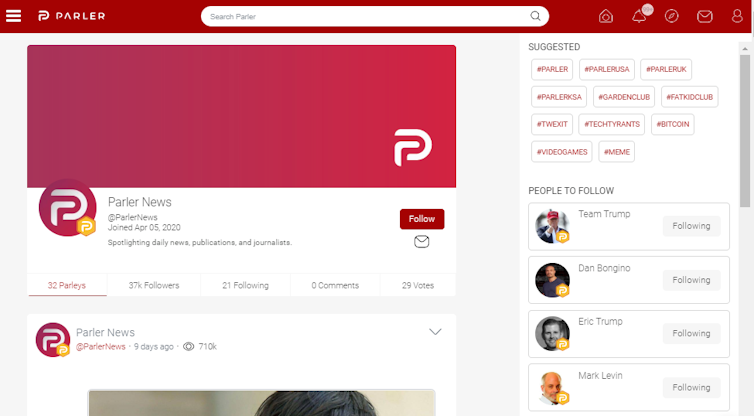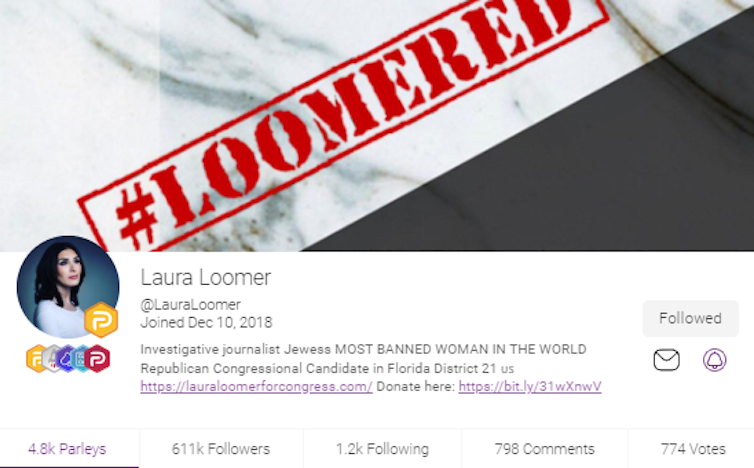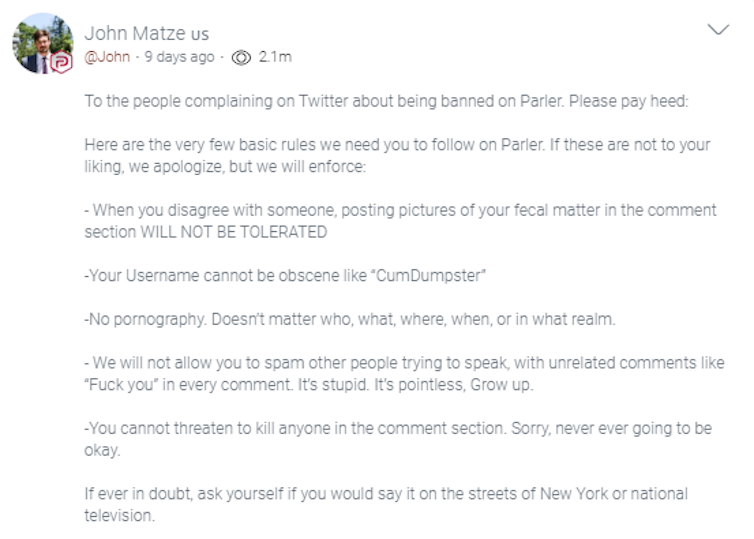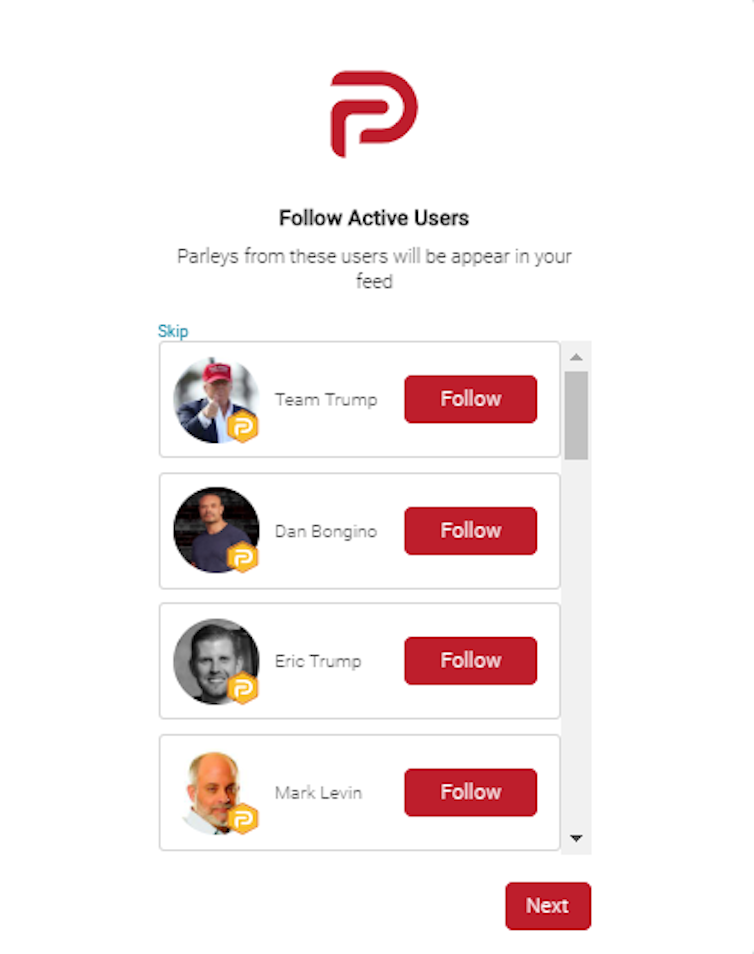Source: The Conversation (Au and NZ) – By Audrey Courty, PhD candidate, School of Humanities, Languages and Social Science, Griffith University
Amid claims of social media platforms stifling free speech, a new challenger called Parler is drawing attention for its anti-censorship stance.
Last week, Harper’s Magazine published an open letter signed by 150 academics, writers and activists concerning perceived threats to the future of free speech.
The letter, signed by Noam Chomsky, Francis Fukuyama, Gloria Steinem and J.K. Rowling, among others, reads:
Debates surroundings free speech and censorship have taken centre stage in recent months. In May, Twitter started adding fact-check labels to tweets from Donald Trump.The free exchange of information and ideas, the lifeblood of a liberal society, is daily becoming more constricted.
More recently, Reddit permanently removed its largest community of Trump supporters.
In this climate, Parler presents itself as a “non-biased, free speech driven” alternative to Twitter. Here’s what you should know about the US-based startup.
Read more: Is cancel culture silencing open debate? There are risks to shutting down opinions we disagree with
What is Parler?
Parler reports more than 1.5 million users and is growing in popularity, especially as Twitter and other social media giants crackdown on misinformation and violent content.

Parler is very similar to Twitter in appearance and function, albeit clunkier. Like Twitter, Parler users can follow others and engage with public figures, news sources and other users.
Public posts are called “parleys” rather than “tweets” and can contain up to 1,000 characters.

Users can search for hashtags, make comments, “echo” posts (similar to a retweet) and “vote” (similar to a like) on posts. There’s also a direct private messaging feature, just like Twitter.
Given this likeness, what actually is unique about Parler?
Fringe views welcome?
Parler’s main selling point is its claim it embraces freedom of speech and has minimal moderation. “If you can say it on the street of New York, you can say it on Parler”, founder John Matze explains.
This branding effort capitalises on allegations competitors such as Twitter and Facebook unfairly censor content and discriminate against right-wing political speech.
While other platforms often employ fact checkers, or third-party editorial boards, Parler claims to moderate content based on American Federal Communications Commission guidelines and Supreme Court rulings.
So if someone shared demonstrably false information on Parler, Matze said it would be up to other users to fact-check them “organically”.
And although Parler is still dwarfed by Twitter (330 million users) and Facebook (2.6 billion users) the platform’s anti-censorship stance continues to attract users turned off by the regulations of larger social media platforms.
When Twitter recently hid tweets from Trump for “glorifying violence”, this partly prompted the Trump campaign to consider moving to a platform such as Parler.

Matze also claims Parler protects users’ privacy by not tracking or sharing their data.
Is Parler really a free speech haven?
Companies such as Twitter and Facebook have denied they are silencing conservative voices, pointing to blanket policies against hate speech and content inciting violence.
Parler’s “free speech” has resulted in various American Republicans, including Senator Ted Cruz, promoting the platform.
Many conservative influencers such as Katie Hopkins, Lara Loomer and Alex Jones have sought refuge on Parler after being banned from other platforms.
Although it brands itself as a bipartisan safe space, Parler is mostly used by right-wing media, politicians and commentators.
Moreover, a closer look at its user agreement suggests it moderates content the same way as any platform, maybe even more.
The company states:
Parler may remove any content and terminate your access to the Services at any time and for any reason or no reason.
Parler’s community guidelines prohibit a range of content including spam, terrorism, unsolicited ads, defamation, blackmail, bribery and criminal behaviour.
Although there are no explicit rules against hate speech, there are policies against “fighting words” and “threats of harm”. This includes “a threat of or advocating for violation against an individual or group”.

There are rules against content that is obscene, sexual or “lacks serious literary, artistic, political and scientific value”. For example, visuals of genitalia, female nipples, or faecal matter are barred from Parler.
Meanwhile, Twitter allows “consensually produced adult content” if its marked as “sensitive”. It also has no policy against the visual display of excrement.
As a private company, Parler can remove whatever content it wants. Some users have already been banned for breaking rules.
What’s more, in spite of claims it does not share user data, Parler’s privacy policy states data collected can be used for advertising and marketing.
Read more: Friday essay: Twitter and the way of the hashtag
No marks of establishment
Given its limited user base, Parler has yet to become the “open town square” it aspires to be.
The platform is in its infancy and its user base is much less representative than larger social media platforms.
Despite Matze saying “left-leaning” users tied to the Black Lives Matter movement were joining Parler to challenge conservatives, Parler lacks the diverse audience needed for any real debate.

Matze also said he doesn’t want Parler to be an “echo chamber” for conservative voices. In fact, he is offering a US$20,000 “progressive bounty” for an openly liberal pundit with 50,000 followers on Twitter or Facebook to join.
Clearly, the platform has a long way to go before it bursts its conservative bubble.
Read more: Don’t (just) blame echo chambers. Conspiracy theorists actively seek out their online communities
– ref. Parler: what you need to know about the ‘free speech’ Twitter alternative – https://theconversation.com/parler-what-you-need-to-know-about-the-free-speech-twitter-alternative-142268






